第101章
There was no leisure in which to play the Indian and cover up our footprints as we made them, but when we came to a brook we stepped into the cold, swift-flowing water, and kept it company for a while. The brook flowed between willows, thickly set, already green, and overarching a yard or more of water. Presently it bent sharply, and we turned with it. Ten yards in front of us the growth of willows ceased abruptly, the low, steep banks shelved downwards to a grassy level, and the stream widened into a clear and placid pool, as blue as the sky above. Crouched upon the grass or standing in the shallow water were some fifteen or twenty deer.
We had come upon them without noise; the wind blew from them to us, and the willows hid us from their sight. There was no alarm, and we stood a moment watching them before we should throw a stone or branch into their midst and scare them from our path.
Suddenly, as we looked, the leader threw up his head, made a spring, and was off like a dart, across the stream and into the depths of the forest beyond. The herd followed. A moment, and there were only the trodden grass and the troubled waters; no other sign that aught living had passed that way.
"Now what was that for?" muttered Diccon. "I'm thinking we had best not take to the open just yet."
For answer I parted the willows, and forced myself into the covert, pressing as closely as possible against the bank, and motioning him to do the same. He obeyed, and the thick-clustering gold-green twigs swung into place again, shutting us in with the black water and the leafy, crumbling bank. From that green dimness we could look out upon the pool and the grass, with small fear that we ourselves would be seen.
Out of the shadow of the trees into the grassy space stepped an Indian; a second followed, a third, a fourth, - one by one they came from the gloom into the sunlight, until we had counted a score or more. They made no pause, a glance telling them to what were due the trampled grass and the muddied water. As they crossed the stream one stooped and drank from his hand, but they said no word and made no noise. All were painted black; a few had face and chest striped with yellow. Their headdresses were tall and wonderful, their leggings and moccasins fringed with scalp locks; their hatchets glinted in the sunshine, and their quivers were stuck full of arrows. One by one they glided from the stream into the thick woods beyond. We waited until we knew that they were were deep in the forest, then crept from the willows and went our way.
"They were Youghtenunds," I said, in the low tones we used when we spoke at all, "and they went to the southward."
"We may thank our stars that they missed our trail," Diccon answered.
We spoke no more, but, leaving the stream, struck again toward the south. The day wore on, and still we went without pause. Sun and shade and keen wind, long stretches of pine and open glades where we quickened our pace to a run, dense woods, snares of leafless vines, swamp and thicket through which we toiled so slowly that the heart bled at the delay, streams and fallen trees, - on and on we hurried, until the sun sank and the dusk came creeping in upon us.
"We've dined with Duke Humphrey to-day," said Diccon at last;
"but if we can keep this pace, and don't meet any more war parties, or fall foul of an Indian village, or have to fight the wolves to-night, we'll dine with the Governor to-morrow. What's that?"
"That" was the report of a musket, and a spent ball had struck me above the knee, bruising the flesh beneath the leather of my boot.
We wheeled, and looked in the direction whence lead come that unwelcome visitor. There was naught to be seen. It was dusk in the distance, and there were thickets too, and fallen logs. Where that ambuscade was planted, if one or twenty Indians lurked in the dusk behind the trees, or lay on the further side of those logs, or crouched within a thicket, no mortal man could tell.
"It was a spent ball," I said. "Our best hope is in our heels."
"There are pines beyond, and smooth going," he answered; "but if ever I thought to run from an Indian!"